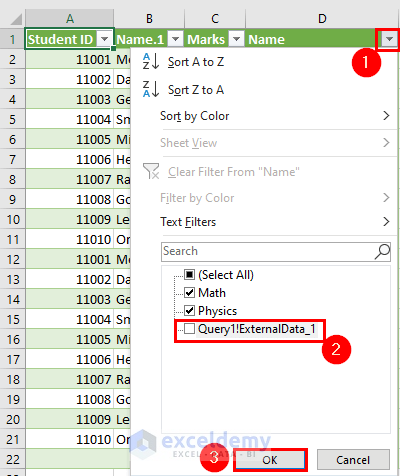Merge Excel Sheets: Show Only Unique Entries Easily

In this blog post, we will delve into the often overlooked but crucial task of merging Excel sheets while focusing on extracting only the unique entries. Excel, a staple in data management and analysis, offers a myriad of functions, but when it comes to combining data from multiple sources, users frequently face challenges in filtering out duplicate entries efficiently. Here, we'll guide you through a step-by-step process to achieve this seamlessly.
What Does Merging Sheets Mean?

Merging sheets involves combining data from two or more Excel workbooks or worksheets into one sheet. While this seems straightforward, ensuring the end result contains only unique entries requires careful consideration. Here’s how you can do it:
Using Excel’s Built-In Features

- Copy and Paste: The simplest approach, but not efficient for large datasets or those needing frequent updates.
- Power Query: A powerful tool in Excel 2016 and later versions that can merge sheets while filtering duplicates.
- VBA Macros: For those comfortable with coding, VBA can automate the merge process with precise control over uniqueness.
Step-by-Step Guide to Merge Sheets with Unique Entries

Method 1: Using Power Query

Power Query is ideal for merging sheets with control over duplicate entries:
- Open Power Query Editor: From the ‘Data’ tab, select ‘Get Data’ -> ‘From File’ -> ‘From Workbook’ to import your first Excel file.
- Load Additional Sheets: Repeat for all sheets you need to merge. Each dataset will appear in the query list.
- Append Queries: Use ‘Home’ -> ‘Combine’ -> ‘Append’ to add all imported datasets into one comprehensive set.
- Remove Duplicates: In the Power Query Editor, click ‘Remove Duplicates’ to keep only unique rows.
- Load to Excel: After processing, click ‘Close & Load’ to return the unique merged dataset to an Excel sheet.
Method 2: Using VBA for Automation

VBA scripting allows for a highly customizable merging process. Here’s a basic VBA code to merge sheets with unique entries:
Sub MergeSheetsUnique() Dim ws As Worksheet Dim wb As Workbook Dim targetWs As Worksheet Dim lastRow As Long Dim destRow As LongApplication.ScreenUpdating = False Set wb = ThisWorkbook Set targetWs = wb.Worksheets("MasterSheet") destRow = 1 For Each ws In wb.Worksheets If ws.Name <> targetWs.Name Then lastRow = ws.Cells(ws.Rows.Count, "A").End(xlUp).Row ws.Range("A1:I" & lastRow).Copy Destination:=targetWs.Cells(destRow, 1) destRow = targetWs.Cells(targetWs.Rows.Count, "A").End(xlUp).Row + 1 End If Next ws 'Remove Duplicates from the Master Sheet targetWs.Range("A1:I" & destRow - 1).RemoveDuplicates Columns:=Array(1, 2, 3), Header:=xlYes Application.ScreenUpdating = True MsgBox "Merge completed with unique entries."
End Sub
🔧 Note: Ensure your target sheet is named "MasterSheet" before running this script. Adjust the column range and data columns if necessary.
Method 3: Manual Merge and Excel Functions

For smaller datasets or one-time merges:
- Consolidate Data: Use ‘Data’ -> ‘Consolidate’, ensuring ‘Function’ is set to ‘Sum’ (or ‘Count’ if you need to track occurrences).
- Remove Duplicates: After consolidating, you can remove duplicates by going to ‘Data’ -> ‘Remove Duplicates’. Select the columns to identify duplicates.
Tips for Maintaining Data Integrity

- Consistent Data Structure: Ensure all sheets you’re merging have the same column order and data types to avoid mismatches.
- Backup: Always keep backups of your original data before merging to prevent data loss.
- Check for Duplicates: After merging, manually or programmatically check for any overlooked duplicates.
By following these methods, you can merge Excel sheets while efficiently managing the challenge of unique entries. Whether you choose Power Query, VBA scripting, or manual consolidation, Excel provides the tools necessary to tailor your data management needs. Merging data with attention to uniqueness not only streamlines your analysis but also ensures data accuracy and reliability.
How can I automate merging multiple Excel sheets?

+
Automating the merge of multiple Excel sheets can be efficiently done using Power Query for a user-friendly interface or VBA macros for custom control. Power Query provides tools to load, append, and filter data with ease, while VBA scripting allows for detailed control over the merging process including handling uniqueness.
Can I merge sheets from different Excel files?

+
Yes, you can merge sheets from different Excel files by using Power Query’s ‘Get Data’ feature to load each file separately and then append the queries to combine them into one dataset.
What if I need to update the merged data?

+
If you’ve used Power Query or VBA to merge your sheets, updating the data involves refreshing the query or re-running the script. For manual methods, you would have to perform the merge process again or update your consolidated data manually.
Does Excel limit the number of sheets I can merge?

+
Excel does not explicitly limit the number of sheets you can merge, but there are practical limits based on system resources and Excel’s capacity to handle data. Large merges might slow down your system or crash Excel if not handled properly.
Is there any way to track duplicate entries before removing them?

+
Yes, you can use conditional formatting or formulas like COUNTIF to highlight duplicates before removing them. This allows you to review which entries are duplicates before proceeding with the removal.